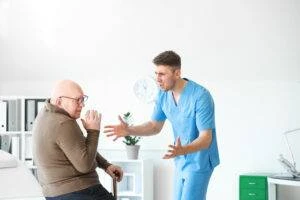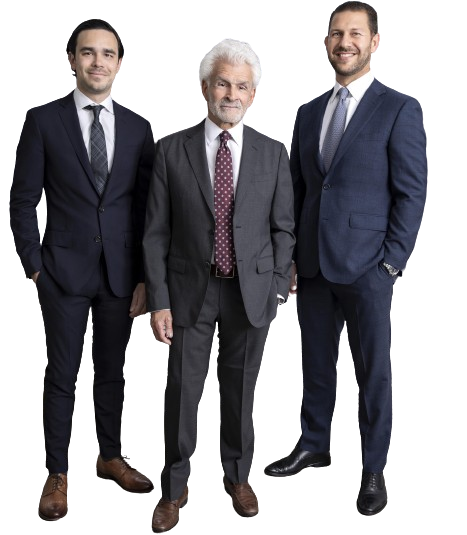
Older adults, especially those who are vulnerable due to physical or cognitive decline, can often be mistreated by caregivers, family members, or nursing home staff, sometimes in ways that are difficult to detect. Abuse can take many forms, from physical harm and emotional neglect to financial exploitation and medical mistreatment, so if you suspect that an elderly loved one is being abused, it’s important to report it. The longer the abuse continues, the more harm they may suffer. What can you do? Who should you call? What legal options do you have?
Recognizing the Signs of Elder Abuse
Elder abuse can happen anywhere. It can happen in a home, nursing facility, or even at the hands of a trusted family member or friend. Because many older adults are hesitant to speak up due to fear, confusion, or medical conditions, it’s often up to family members and friends to recognize the warning signs.
Elder abuse falls into several categories, including physical abuse, emotional abuse, neglect, financial exploitation, and medical abuse. Each type has its own signs and red flags.
Physical Abuse and Neglect
If an elderly person is being physically abused or neglected, you may notice:
- Unexplained bruises, cuts, burns, or fractures
- Frequent hospital visits or trips to the emergency room
- Sudden weight loss or dehydration
- Poor hygiene (dirty clothes, unwashed hair, bedsores)
- Being left alone for long periods without supervision or care
Emotional or Psychological Abuse
Not all abuse is physical. Emotional abuse can be just as damaging, and the signs can be more subtle:
- Sudden changes in personality (fearful, withdrawn, anxious, or depressed)
- Refusing to speak in front of caregivers or acting fearful around certain people
- Unusual behaviors such as rocking, mumbling, or self-harm
Financial Exploitation
Elderly individuals are often targeted for financial scams and theft, sometimes by the very people trusted to care for them. Signs to watch out for include:
- Unexplained withdrawals from bank accounts
- Changes in their will or power of attorney that seem suspicious
- Missing valuables, cash, or checks
- Bills going unpaid even when the senior has enough money
Nursing Home and Assisted Living Facility Abuse
If your loved one is in a nursing home or assisted living facility, keep an eye out for:
- Unsanitary living conditions (dirty bedding, bad smells, cluttered rooms)
- Lack of proper medical care (bedsores, untreated infections, medication errors)
- Staff members refusing to let you visit alone or controlling conversations
- Other residents showing signs of neglect or mistreatment
Have You Been Injured In An Accident? Contact Morelli Law
877-751-9800What to Do if You Suspect Elder Abuse
First off, if you believe your loved one is in immediate physical danger, call 911 right away. If you believe an elderly person is being abused, neglected, or exploited, do not ignore it. The situation can get worse if no one steps in. What should you do? Act quickly to:
Talk to Your Loved One (If Possible)
If the elderly person is mentally capable, ask them if they feel safe or if they need help. Be gentle and patient. Remember that they may be afraid to speak out.
Gather Evidence
Take notes on what you observe, including dates, times, and details of any injuries, strange behavior, or financial inconsistencies. If possible, take photos of injuries or poor living conditions.
Speak with Caregivers or Nursing Home Staff
If your loved one is in a facility, ask the staff about their condition. If they avoid answering your questions, seem defensive, or offer inconsistent explanations, this could be a red flag. Try to avoid accusing them of anything or confronting them, as this may escalate tensions and cause a dangerous situation.
How to Report Elder Abuse in New York
New York has several agencies dedicated to handling elder abuse cases. The right agency to contact depends on where the abuse is happening.
For abuse at home (by a caregiver or family member), call New York State Adult Protective Services (APS). Their website can be found here. APS investigates cases of abuse, neglect, and financial exploitation of vulnerable adults.
If the abuse is happening in a nursing home, file a complaint with the New York State Department of Health online at www.health.ny.gov.
If it’s an assisted living facility, contact the New York State Office of the Long-Term Care Ombudsman Program. The Ombudsman Program acts as an advocate for residents and investigates complaints.
If you suspect financial abuse, report it to:
- The local police department (for potential fraud or theft)
- The New York Attorney General’s Elder Abuse Unit
- The elderly person’s bank to put fraud protections in place
Filing a Lawsuit for Elder Abuse in New York
If your loved one has suffered serious harm, financial losses, or wrongful death due to elder abuse, you have the right to take legal action. Filing a lawsuit can help hold the responsible party accountable, recover financial compensation for medical expenses, pain, and suffering, and even force nursing homes or caregivers to improve safety measures.
Contact our personal injury lawyers today
877-751-9800How to Start a Lawsuit
The first step is to contact an experienced elder abuse attorney who can investigate your case and determine your legal options. At Morelli Law, we take these cases very seriously. Our experienced legal team will help you:
- Gather medical records, financial documents, and witness statements
- Consult with medical and legal experts to prove the abuse
- Negotiate with insurance companies or the nursing home to reach a settlement
- File a lawsuit if necessary to fight for full compensation
Protect Your Family and Friends
Elder abuse is a serious and preventable problem. No one should have to suffer at the hands of an untrustworthy caregiver, neglectful family member, or irresponsible nursing home. If you see something suspicious, speak up—it could save someone’s life.
If your loved one has been abused, neglected, or exploited, contact us today for a free consultation. Your loved one deserves safety, dignity, and justice.
Call or text 877-751-9800 or complete a Free Case Evaluation form




